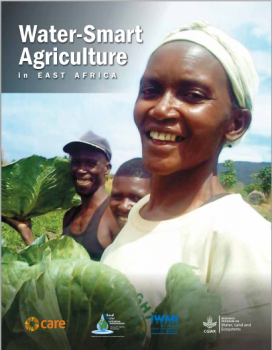New book provides practical advice for farmers to make the most of their farm in climate and water uncertain times
Farmer Tom Acuma is a water smart pioneer. On his 24 hectare plot in Uganda’s Otuke district he harvests runoff water into a pond that he can then use for supplementary irrigation. He also incorporates mulch and manure into his carefully tended planting ridges; a combination that encourages the infiltration of rainwater and conserves soil fertility and moisture. As a result he can grow a huge range of crops all year round – enough to feed his large family and sell the excess in local markets.

Simple techniques like these could benefit many more East African Farmers like Tom, if only they were more widely known and adopted. Now a new book, produced by the CGIAR Research Program on Water, Land and Ecosystems (led by IWMI) in partnership with Care and the Global Water Initiative East Africa (GWI EA) aims to address this gap.
The Sourcebook on Water-Smart Agriculture in East Africa is a collection of case studies that clearly show how farmers can improve their own water management and increase yields, often with very little outlay. The approaches featured in the book range from soil conservation to the planting of drought tolerant crops.
“We have tried to give farmers a range of options,” says IWMI’s Alan Nicol, one of the book’s editors. “And we have been surprised by how many techniques have been developed by East Africa’s farmers themselves. It is great that we have been able to include these tried and tested methods.”
The sourcebook is aimed at development managers, educators, local administrators and policy makers. These are the people who can utilize such practical research outputs, thereby enabling impact at scale at both local and national levels.
“One of the unique aspects of this sourcebook compilation is that it was developed through a series of national writeshops in Uganda, Tanzania and Ethiopia.” says Simon Langan. “In these writeshops, researchers, editors and artists came together to repackage previously published work to make it accessible to field workers and development planners”.
Download the complete sourcebook here: https://cgspace.cgiar.org/bitstream/handle/10568/64962/WaSA%20final%20version%2007.11.2015.pdf?sequence=4

